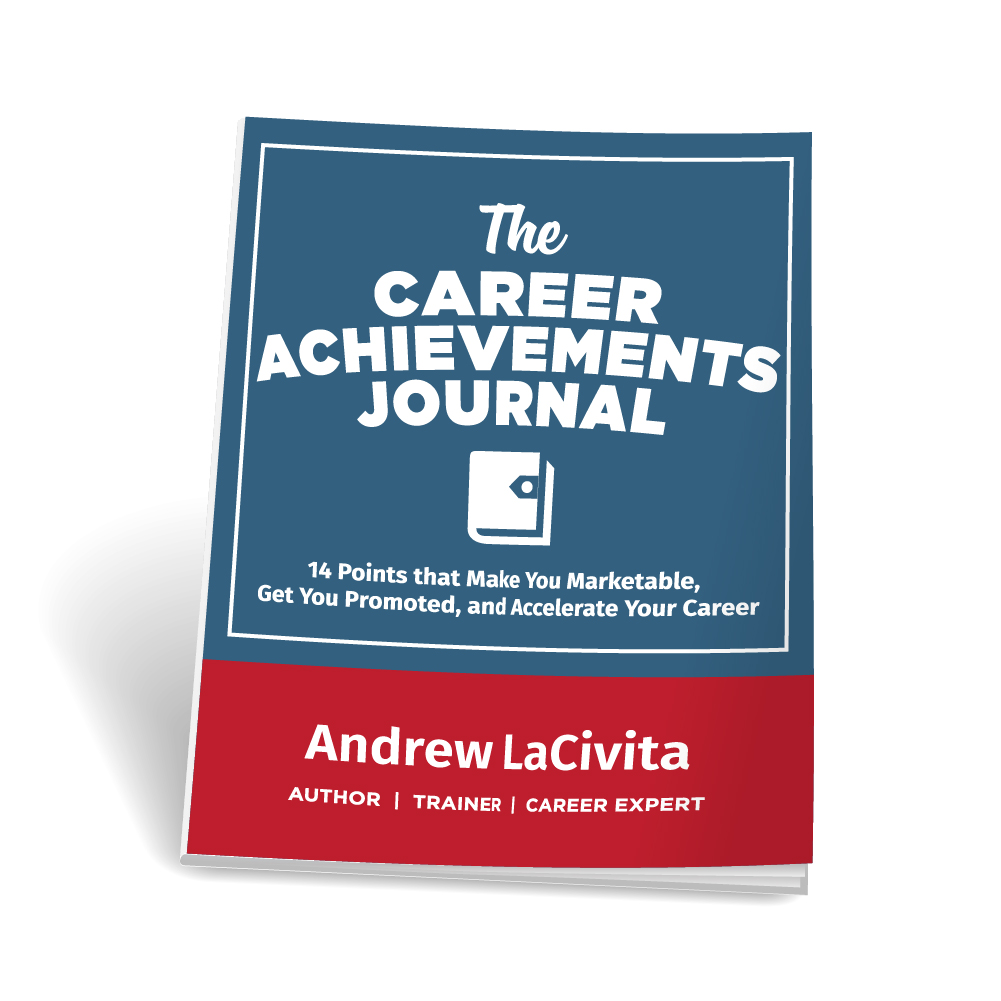Listen to Podcast Now:
Having a tough time explaining your fabulousness to your employer? Having difficulty getting promoted? Feeling unappreciated? Join career expert and award-winning author Andrew LaCivita as he discusses how to get promoted quickly at work with this resume building tool.
This issue is the same whether you’re not getting ahead in your organization or not hearing back from employers when you send out your resume!
You need some oomph behind the story of your career. It’s there! You’re just not telling it!
Yawner…
When it comes to career advancement and promotions, you already know to work hard, work smart, show up to work on time, smile and display that great attitude. Yawn. I won’t bore you with that…
You deserve the advanced course…
I’ll teach you something that will:
- Give you perspective on what you’ve accomplished, show you how far you’ve advanced, and highlight how you’ve helped your teams, your companies, and the rest of the world. Aye. You did all that. Yes. You.
- Provide a solid basis and data for you to conduct effective discussions with your current employer during your performance reviews, annual reviews, and promotion opportunities.
- Show you what to populate on your resume (because Heaven knows how most of us struggle with this).
Who doesn’t love a journal?
Call it whatever you want—an employee journal, an employee diary, and so on. I’ve called it a Career Achievements Journal and you can grab the FREE DOWNLOAD here: Career Achievements Journal: 14 Points that Make You Marketable, Get You Promoted, and Accelerate Your Career. 
For every project or major initiative you undertake, capture the following fourteen points. Do this for every major undertaking however and whenever it arises.
You might have a project last a day, a month, or a year. The length is unimportant as is whether you do your projects serially or simultaneously. Each project has it’s own list.
- Project Name: List all major projects and initiatives. They can be a daylong, monthlong, or yearlong initiative.
- Statistics: Identify anything quantifiable. This includes budget, timeframe, number of resources, number of customers, etc. Capture anything that shows magnitude and impact.
- Business Problem: Identify the high-level business problem you and your company are trying to overcome, improve, and so on.
- The Players: List everyone involved from stakeholders, contributors, key team members, units within your organization, partners, and vendors to customers or companies who are benefiting from your project.
- Solution: Identify how, at a high-level, you and your company solved the problem.
- Result/Outcome: Capture what happened as a result of the project implementation.
- Benefits: Capture the entities that benefited (employees, customers, partners, other units in the organization) as well as specifically how they benefited.
- Challenges: List the high-level challenges that surfaced during the project. There are the issues that arose as you were building your solution (as opposed to the high-level business problem you were addressing overall).
- Overcame Challenges: Identify how you overcame the challenges throughout the project.
- Hindsight: Identify what you would have done differently if you started the project knowing what you know now.
- Lessons Learned: Capture the high-level lessons you and your organization learned as a result of implementing the project.
- Your Development: Identify how you grew specifically. What can you do now that you couldn’t at the beginning of the project? What new skills do you have?
- Company Development: Identify how your company grew and improved. What can your company do now that it couldn’t at the beginning of the project?
- Victories: Reflect on the high-level victories you achieved over the course the project. Even if the project wasn’t implemented fully, still consider all the accomplishments along the way!!
You might be successful but…
You will never feel successful or happy if you don’t take the time to reflect on all you’ve accomplished.
It’s also extremely important for your personal and professional growth to take time to evaluate the lessons, benefits, and so on of your experiences. If you don’t, you’ll be prone to stagnation not to mention susceptible to repeating your mistakes!
Also, check out 8 Great Tips to Prove Your Value on Your Resume. It goes hand in hand with this lesson.
Make sure to grab the FREE DOWNLOAD. Get it here: Career Achievements Journal: 14 Points that Make You Marketable, Get You Promoted, and Accelerate Your Career
Now, go out and set the world on fire with all you’ve accomplished!
Like this episode? Please share it via social media and review it on iTunes! I can keep this blog and all future podcasts and videos ad-free and sponsor-free ONLY because you share my work! Please share or subscribe to my podcast and YouTube channel too!
Want more advanced material? Join the milewalk Academy and grab some of the free offerings that support the instruction in this post!
Have you seen my FREE Job Interviewing Webinar titled 3 Keys to Ace Any Job Interview? There are several available times this week. Attendees receive an awesome eBook titled Ace Your Job Interview. Check it out!









Hi I am trying to download the career achievement journal, but the page gives an error.
Sorry Maryam, we were in the process of changing over some systems. Head here: https://www.milewalkacademy.com/andrew-lacivita-career-achievements-journal-free-download